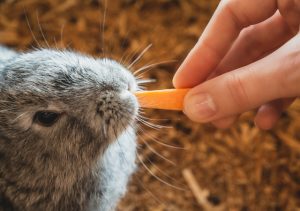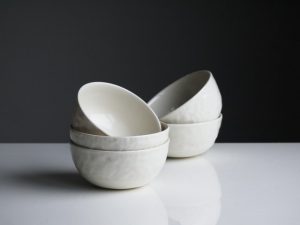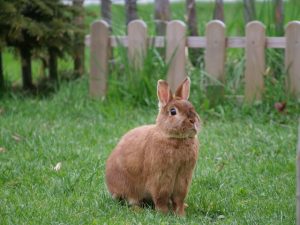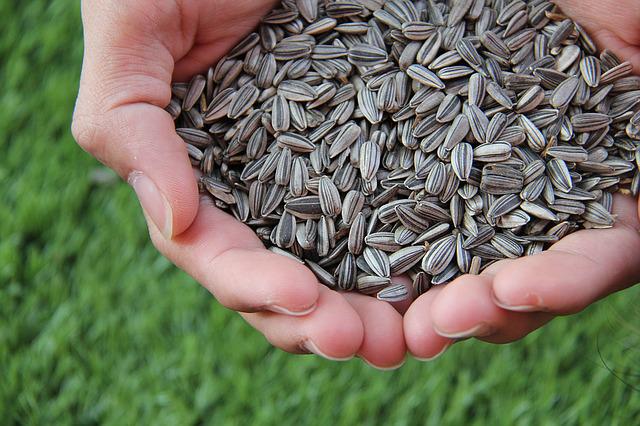
By now, it should be obvious that Rabbits love seeds. Should you be feeding your Rabbit Sunflower seeds? For a human, the sunflower is pleasing both visually and as a snack. However, rabbits have a drastically more sensitive digestive system than a human does.
Like all other food you give your Rabbit, Sunflower seeds should be given in a small amount and then not given for a couple of days. It is highly important to determine what may or may not happen to the rabbit, and the digestive tract.
Rabbits are somewhat like people in that they have individual tastes. This means that some rabbits will eat certain foods while others will not go near those food items. This is true even when speaking about the 13 species of Cottontail rabbits. I mention Cottontails because the variety of Cottontails is drastically different.
The sunflower seeds that are produced for birds are coated with an oil base that attracts many animals to the smell. The rabbits will search for and eat any food they can find that will fill them up. The wild rabbits will eat as much as they can, and also as quickly as they can to store up fat for those times when foods are not as readily or easy to be found.
For many of us who enjoy watching birds, we likely feed the birds continuously. As the birds eat, they will likely spill some of the seeds, including sunflower seeds onto the ground. This makes the wild rabbits quite happy.
It is not much of a challenge for the rabbit to dig deep enough to get under the fence. This is one reason why it is so imperative that people never feed a rabbit by hand, whether it is sunflower seeds, the Black Oil sunflower seeds are probably the best for a rabbit, due to the thinner shell. The oil is actually nutritious for the rabbit.
It will also help the rabbit hold some fat on its body in preparation for the months when food is harder to find, and also in the winter months when a rabbit spends time trying to stay warm. It is never a good idea to hand feed the wild rabbits. The domesticated furry friends in your life that live in a cage can be hand-fed, but do not do this continuously. Cotton tails, and other non-domesticated rabbits have the instinct to locate food so they supply their own needs.
Domesticated rabbits should not be left to fend for themselves. The domesticated rabbit should be fed a diet of the recommended foods. This diet should not be strayed from. Not only do the greens, pellets and other foods keep your domesticated rabbit healthy and happy, but it also prevents them from gorging on foods that they should not have.
Allowing the domesticated rabbit to have Sunflower seeds as a treat is acceptable as long as it is not a large amount each day. Most veterinarians will recommend allowing your rabbit some sunflower seeds once or twice a week.
Diets
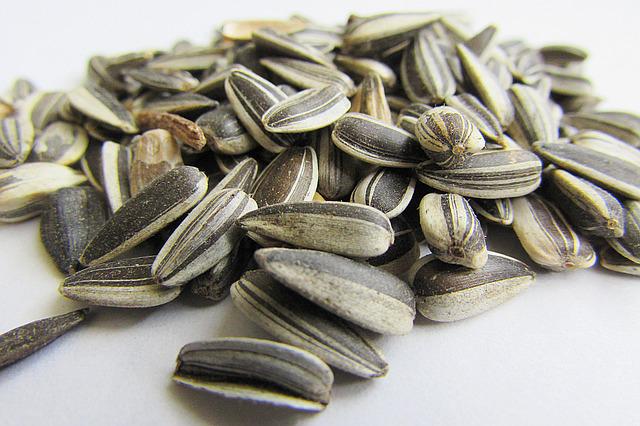
As I previously stated, almost species of rabbits will have different diet patterns. However, rabbits are herbivores that will eat most types of plants and vegetables found in the wild. The different species will all eat various plants from the wild.
Wild rabbits, if they find birdseed, will eat it and not leave it for the birds it was meant for. The main diet for wild rabbits includes grasses, hay and the lettuce found in the wild. You may also notice when the rabbit has eaten the birdseed, if there are Black Oil Sunflower seeds mixed in, these will likely be eaten first. Luckily, birdseed is not something that a wild rabbit will just find in the wild. The birdseed is made and packaged by humans, in order for a wild rabbit to find birdseed, it would have to have been left there by a human.
Bird Seed Mix
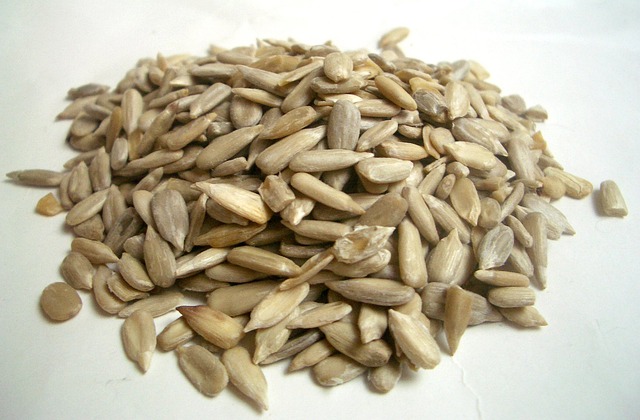
One point that many humans do not consider is that bird seed is all plant-based. With rabbits, both wild and domesticated, being herbivores, they have no issues eating bird seed.
Bird seed mixes will usually contain a mix of seeds, sunflowers, corn millet, raisins, cherries and peanuts.
When you have verified that the bird seed is completely plant-based, you can give a small amount to the domesticated rabbit and also to the wild rabbits. Again, do not give them a large amount as the seed is not nutritionally complete for the rabbit. You must also remember that a rabbit cannot fully digest bird seed.
During certain times of the year, mainly spring and summer, sometimes fall, there is an abundance of birdseed out in the open. Wild rabbits will not hesitate. For this reason, I personally am sure to have plenty of the black oil sunflower seeds available and I will take them to the edge of our property and sprinkle them around there. I do avoid having the Black Oil Sunflower Seeds near the house. I would like to keep the wild rabbits in the wild, not turn them into a domesticated version of a wild rabbit.
There will be many times that a rabbit will prefer a change to the routine. The same foods each day, every day become monotonous and even the rabbit enjoys a change once in a while.
Many rabbits will also choose to eat birdseed over other foods to conserve energy. They may also have dental issues that make it difficult for them to chew on normal foods. Since the birdseed requires very little chewing, the rabbit will be able to eat it much quicker.
Black Oil Sunflower Seeds
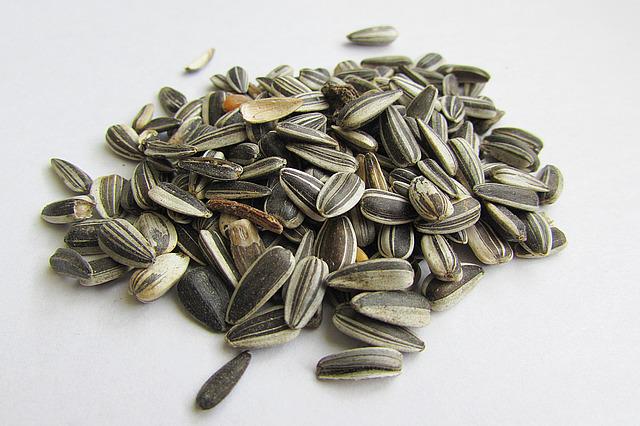
It may seem difficult to believe, however, there is some nutrition for a rabbit in the Black Oil Sunflower seeds. The following nutrition is found in the BOSS.
Potassium is needed in a rabbit’s diet as they tend to lose potassium as they defecate.
28 per cent fat – Fat in a rabbit's diet functions as an energy source, and aids in the absorption of fat-soluble vitamins (A, D, E and K). It also adds lustre and gloss to the fur and helps slow shedding.
25 per cent fibre – This helps provide the bulk and forage requirements for a rabbit and also promotes a healthy gut.
15 per cent protein – Protein is needed for growth, disease resistance, milk production, general health and reproduction.
Calcium – Calcium plays a key role in bodily processes, such as heart function, muscle contraction, coagulation, and electrolyte levels in the blood. But you do not want excess calcium in a rabbit's diet as this can cause urinary tract problems.
B vitamins- A rabbit produces its own b vitamin by bacteria in the hindgut of the rabbit, their requirements are fulfilled through caecotrophy. So B is not very important to a domestic rabbit.
Vitamin E – helps to remove toxins out of your rabbit’s body this helps to maintain the immune system.
Benefits and Risks
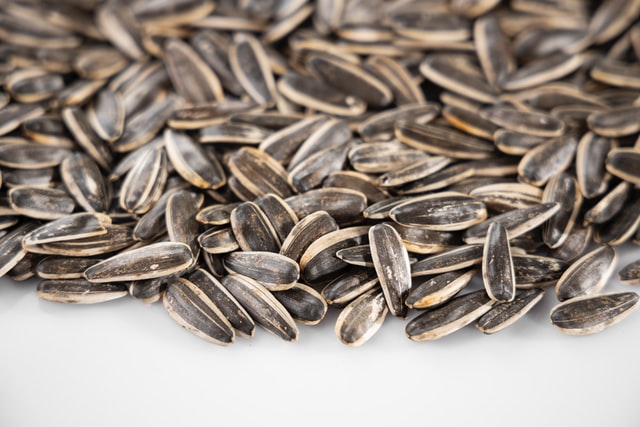
The black oil sunflower seeds are packed with nutrition, amino acids, and calories, so they are a great supplement for almost any rabbit to one degree or another. They do help with shiny coats also.
It is possible that the BOSS is too high in protein and calories. This could cause heat issues during the summer months. If fed too much too often maybe some weight gain, and moulting problems. Science believes the benefits of BOSS outweigh the negatives. When you decide to, definitely feed the rabbit the Sunflower seeds with the shells for necessary fibre.
The shells are easy to chew through for rabbits. Black oil sunflower seeds often stimulate your rabbit to gain weight due to their high-fat content. This extra body weight helps rabbits maintain their body temperature in the winter, fall, and spring months. Your rabbit may not need to maintain as much body heat in the summer months, so consider cutting back the amount of black oil sunflower seeds your rabbit consumes during those months.
In order to make sure that your rabbit stays healthy their main diet should consist of fresh timothy hay and water. As well as rabbit pellets from the local pet store that are designed to give them the nutrients they need for their diet.
In addition, variety is key to their happiness so make sure you research what types of foods are safe for rabbits to eat before giving them other new foods. Exercise and attention also are good for your rabbit. Make sure you spend time with them and play with them and let them run around outside of their cage each day but don’t scare them.
Again, to reiterate, feeding your rabbit some Black Oil Sunflower Seeds is okay once in a while. These sunflower seeds make for a special treat, however, they should never be used as part of their normal diet.
They also should have fewer of the Black Oil Sunflower Seeds in the summer months than you would give them in the fall and winter. The sunflower seeds will cause the rabbit to retain some fat and this could lead to further issues in the warmer months. Some issues could be moulting or excessive weight gain.


